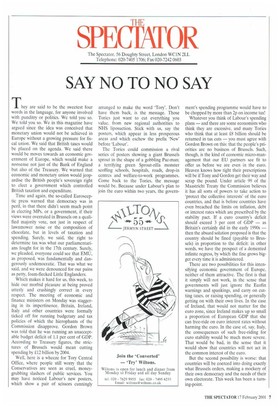SAY NO TO NO SAY
They are said to be the sweetest four words in the language, for anyone involved with punditry or politics. We told you so. We told you so, We in this magazine have argued since the idea was conceived that monetary union would not be achieved in Europe without a growing pressure for fiscal union. We said that British taxes would be placed on the agenda. We said there would be moves towards an economic government of Europe, which would make a nonsense not just of the Bank of England but also of the Treasury. We warned that economic and monetary union would jeopardise the British people's sovereign right to elect a government which controlled British taxation and expenditure.
Time and again, the so-called Eurosceptic press warned that democracy was in peril, in that there didn't seem much point in electing MPs, or a government, if their views were overruled in Brussels on a qualified majority vote, not just in respect of lawnmower noise or the composition of chocolate, but in levels of taxation and spending. Surely, we said, the right to determine tax was what our parliamentarians fought for in the 17th century. Surely, we pleaded, everyone could see that EMU, as proposed, was fundamentally and dangerously undemocratic. That was what we said, and we were denounced for our pains as petty, foam-flecked Little Englanders.
Which makes it hard for us, this week, to hide our morbid pleasure at being proved utterly and crashingly coned t in every respect. The meeting of economic and finance ministers on Monday was staggering in its impertinence. Britain, Ireland, Italy and other countries were formally ticked off for running budgetary and tax policies of which the hierophants of the Commission disapprove. Gordon Brown was told that he was running an unacceptable budget deficit of 1.1 per cent of GDP. According to Treasury figures, the strictures of Brussels would mean cutting spending by £12 billion by 2004.
Well, here is a wheeze for Tory Central Office, where people still worry that the Conservatives are seen as cruel, moneygrubbing slashers of public services. You may have noticed Labour's new posters, which show a pair of scissors cunningly arranged to make the word 'Tory'. Don't have them back, is the message. Those Tories just want to cut everything you value, from new regional authorities to NHS liposuction. Stick with us, say the posters, which appear in less prosperous areas and which eschew the prefix 'New' before 'Labour'.
The Tories could commission a rival series of posters showing a giant Brussels sprout in the shape of a gobbling Pac-man; a terrifying green Sprout-zilla monster scoffing schools, hospitals, roads, drop-in centres and welfare-to-work programmes. Come back to the Tories, the message would be. Because under Labour's plan to join the euro within two years, the govern ment's spending programme would have to be chopped by more than 2p on income tax?
Whatever you think of Labour's spending plans — and there are some economists who think they are excessive, and many Tories who think that at least £8 billion should be returned in tax cuts — you must agree with Gordon Brown on this: that the people's priorities are no business of Brussels. Such, though, is the kind of economic micro-management that our EU partners see fit to offer us before we are even in the euro. Heaven knows how tight their prescriptions will be if Tony and Gordon get their way and scrap the pound. Under article 99 of the Maastricht Treaty the Commission believes it has all sorts of powers to take action to 'protect the collective interests' of the euro countries, and that is before countries have even breached the limits on inflation, debt or interest rates which are prescribed by the stability pact. If a euro country's deficit should exceed 3 per cent of GDP — as Britain's certainly did in the early 1990s — then the absurd solution proposed is that the country should be fined (payable to Brussels) in proportion to the deficit: in other words, we have the prospect of a demented infinite regress, by which the fine grows bigger every time it is administered.
There are two possibilities for this intensifying economic government of Europe, neither of them attractive. The first is that it simply will not work, in the sense that governments will just ignore the Ecofin warnings and spankings, and carry on cutting taxes, or raising spending, or generally getting on with their own lives. In the case of Ireland, that would not matter for the euro zone, since Ireland makes up so small a proportion of European GDP that she can free-ride on euro interest rates without harming the euro. In the case of, say, Italy, the consequences of such free-riding for euro stability would be much more severe, That would be bad, in the sense that it would show that countries will not act in the common interest of the euro.
But the second possibility is worse: that countries will be coerced into doing exactly what Brussels orders, making a mockery of their own democracy and the needs of their own electorate. This week has been a turning-point.


































































 Previous page
Previous page